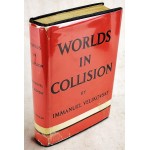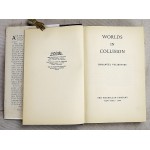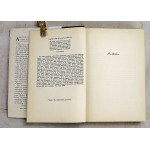Worlds in Collision
Worlds in Collision
Velikovsky, Immanuel
The Macmillan Company, 1950
[Stated First Printing] Hardcover and dust jacket. Tears to jacket, some repaired with tape. Dust jacket in protective mylar cover. Good binding and cover. Bookplate removed from rear end page. Owner's name on front end page.
"Immanuel Velikovsky was the Russian born writer whose theories about colliding planets entertained and outraged the scientific world while mesmerizing millions of science buffs. Trained as a physician and psychiatrist in Moscow during the early 1900's, Dr. Velikovsky studied Freud's analysis of the subconscious mind of Moses. That work, coupled with his own vast knowledge of mythology and Biblical lore, led him to embark on an unorthodox lifelong course of study summarized in his now famous 'Worlds in Collision,' published in 1950. Dr. Velikovsky's fanciful theories centered on his belief that a fragment of the planet Jupiter, later identified as Venus, careered through the heavens around 1500 B.C., and lightly brushed against the planet Earth, causing a series of catastrophic consequences earthlings have since tried to forget, hence the origin of a Velikovsky notion he called 'collective amnesia.' Among the effects of the collision, according to the writer, were these: interruption of the Earth's rotation, causing the oceans to spill; the leveling of mountains in some places and their sudden establishment in other locations. According to Dr. Velikovsky, before Venus proceeded on its troubled course, disturbing the heavenly peace for at least another 52 years, it sprinkled a trail of hydrocarbons in its wake. Turning aside the body of conventional scientific knowledge in many disciplines whose domains his ideas touched, Dr. Velikovsky, for instance, rebutted the argument of geologists who pointed to fossil tree rings as proof of an uninterrupted diurnal cycle in the world's history for the last 360 million years. Dr. Velikovsky's controversial theory and his popularity with much of the lay public led some of his critics to threaten his publishers with boycotts and caused others to dismiss him affectionately as the 'Grand old man of the fringe. With near religious zeal, his supporters point proudly to his acceptance by others such as his close friend, Dr. Albert Einstein, with whom he exchanged a lively correspondence and personal visits. An annotated copy of 'Worlds in Collison' was found at Dr. Einstein's bedside after his death, the Velikovsky supporters say proudly." - NY Times Obit.



